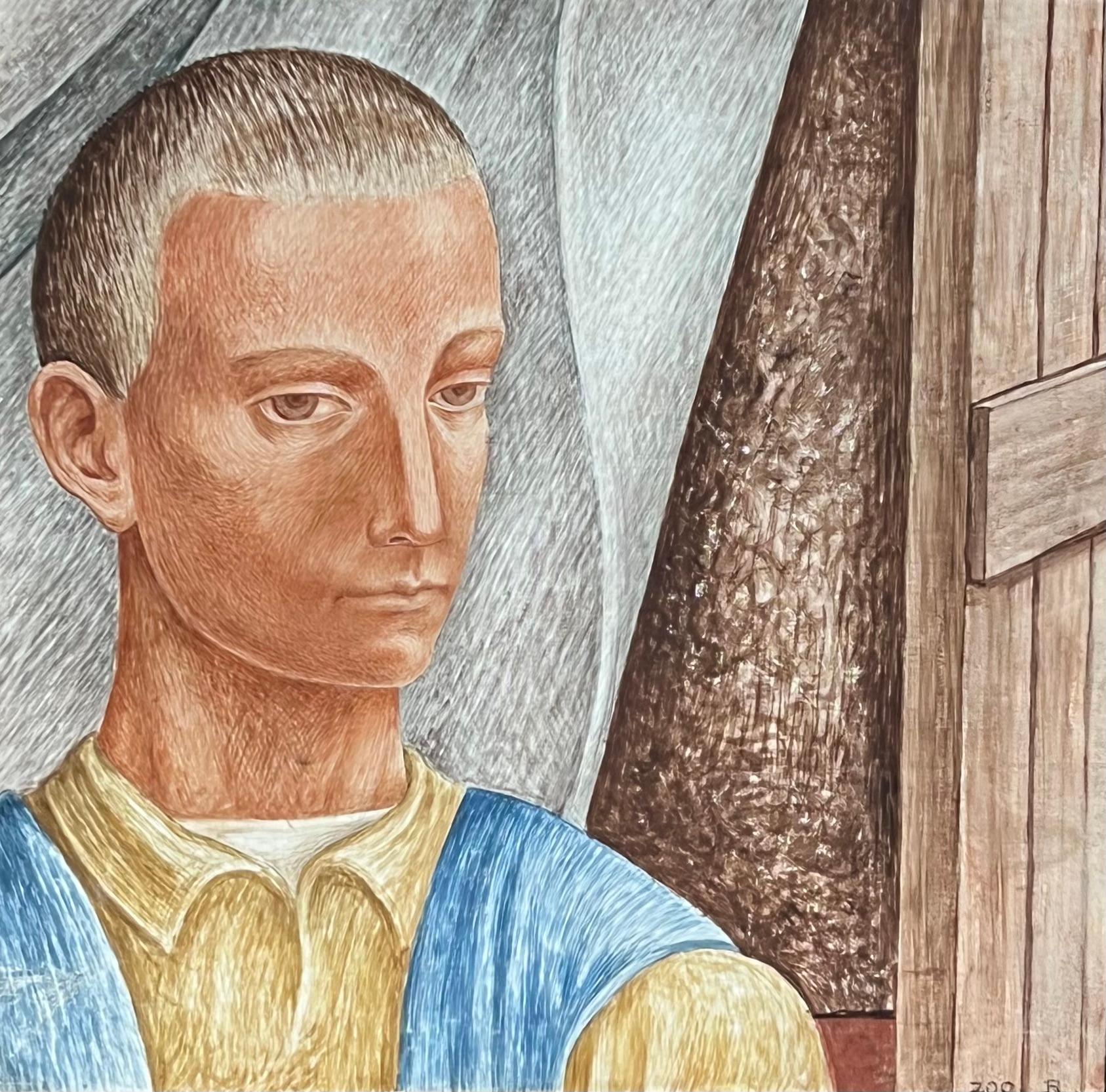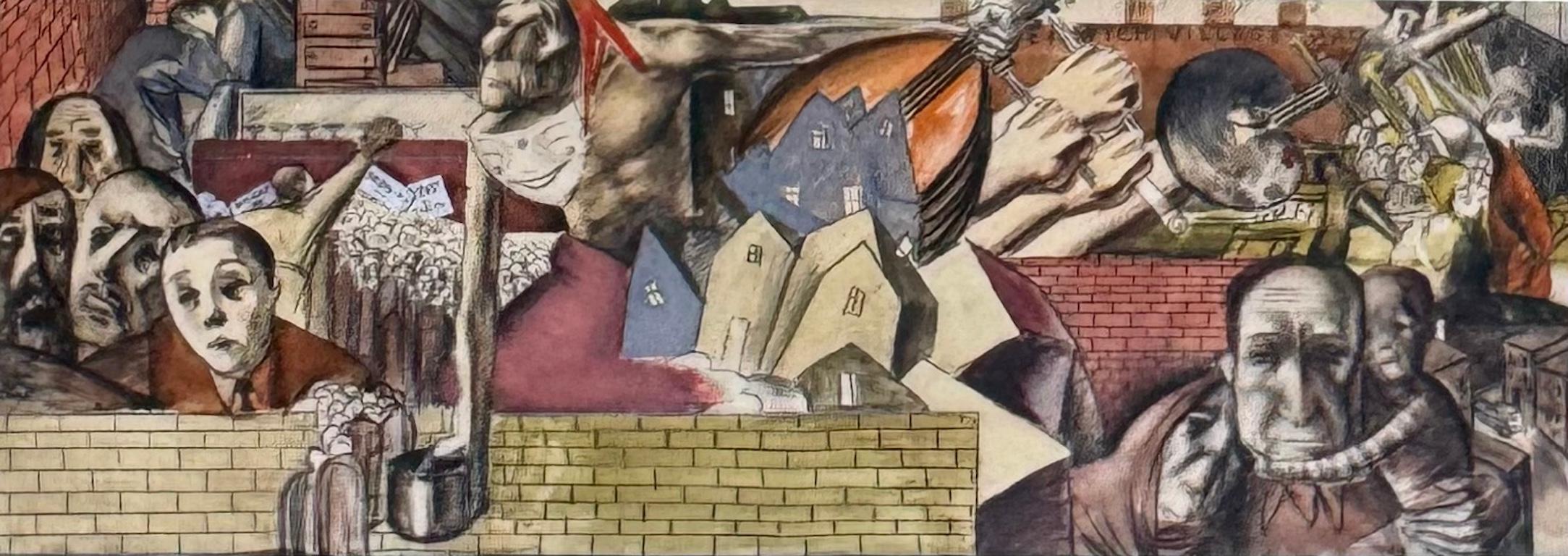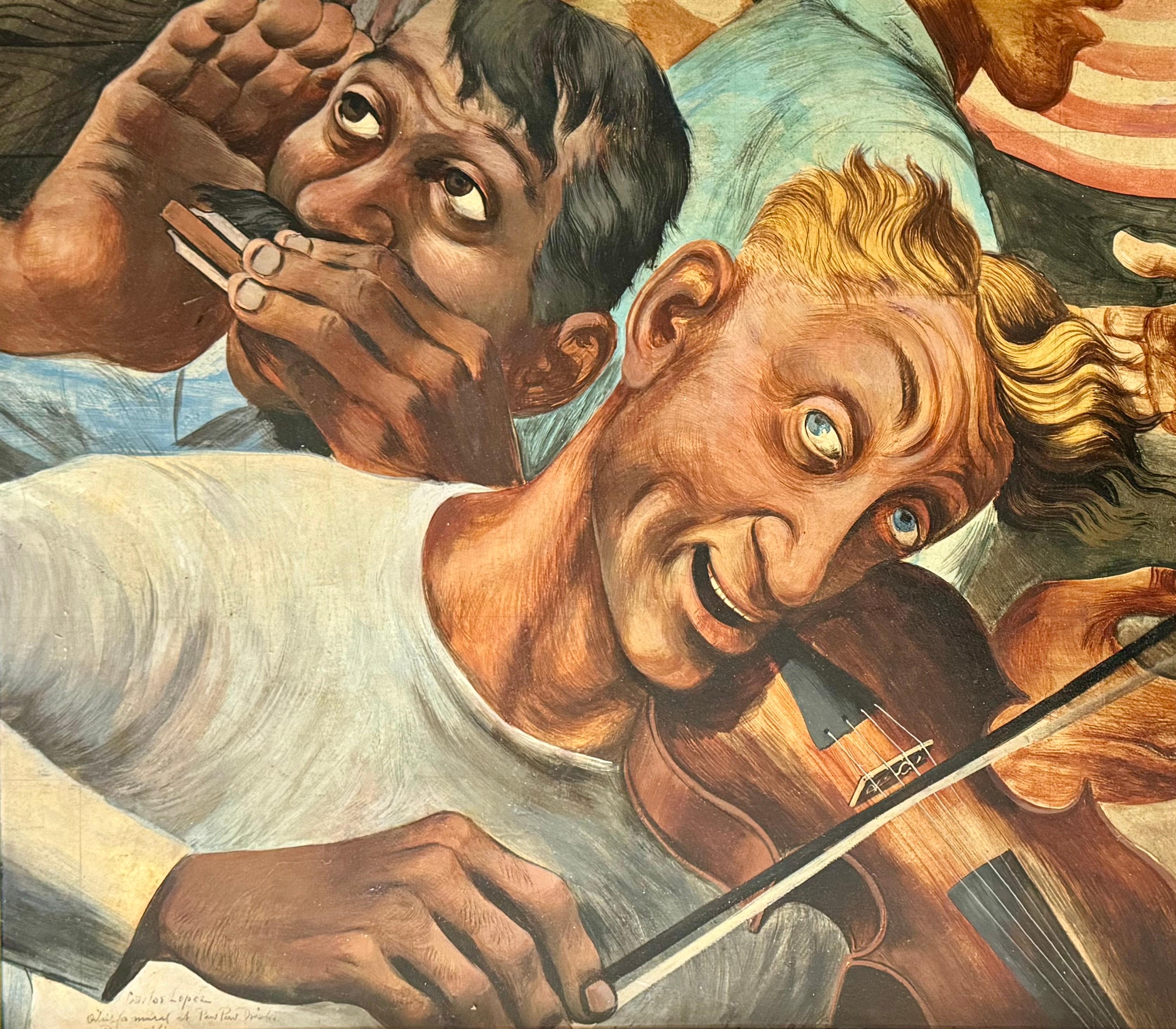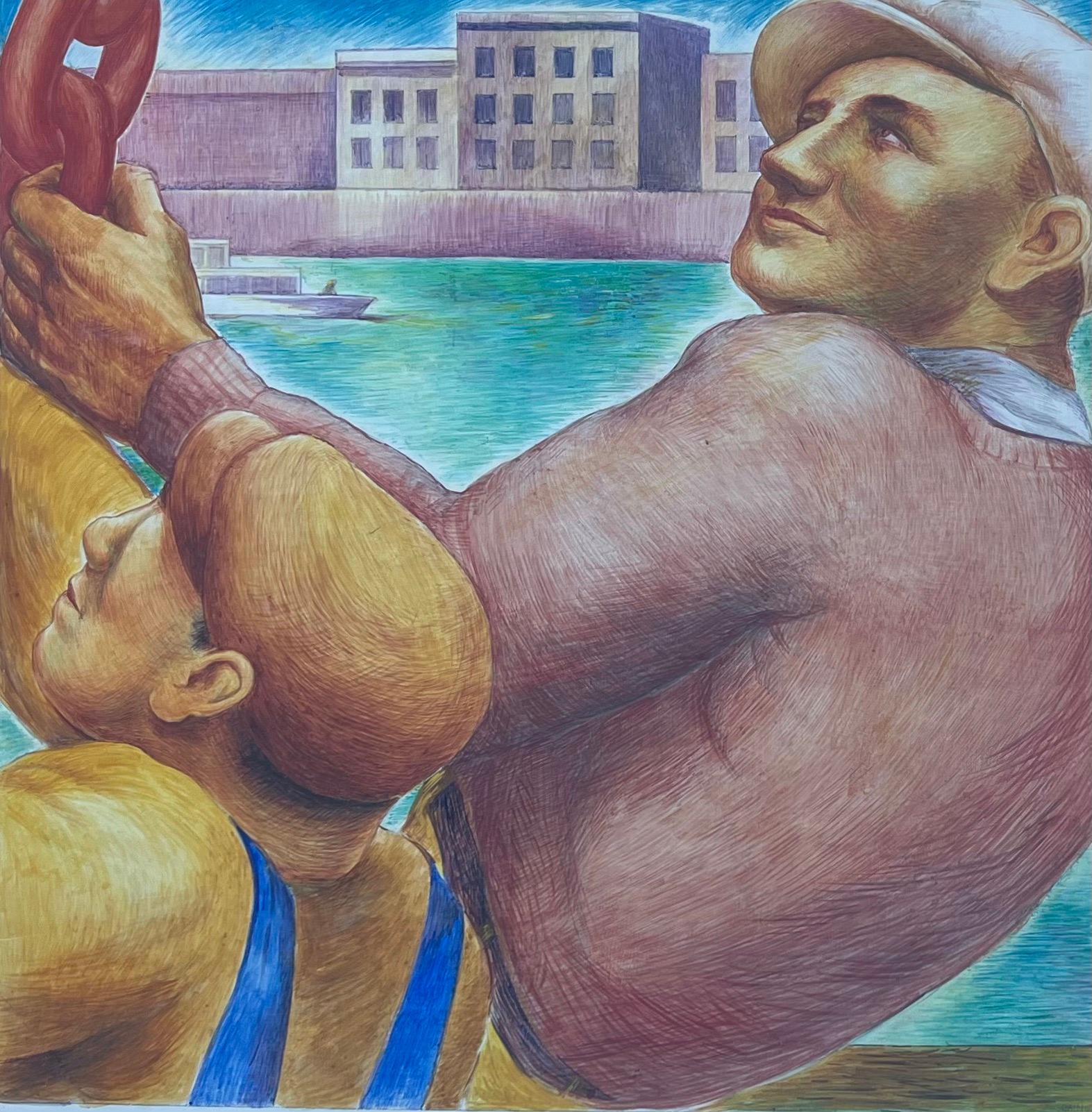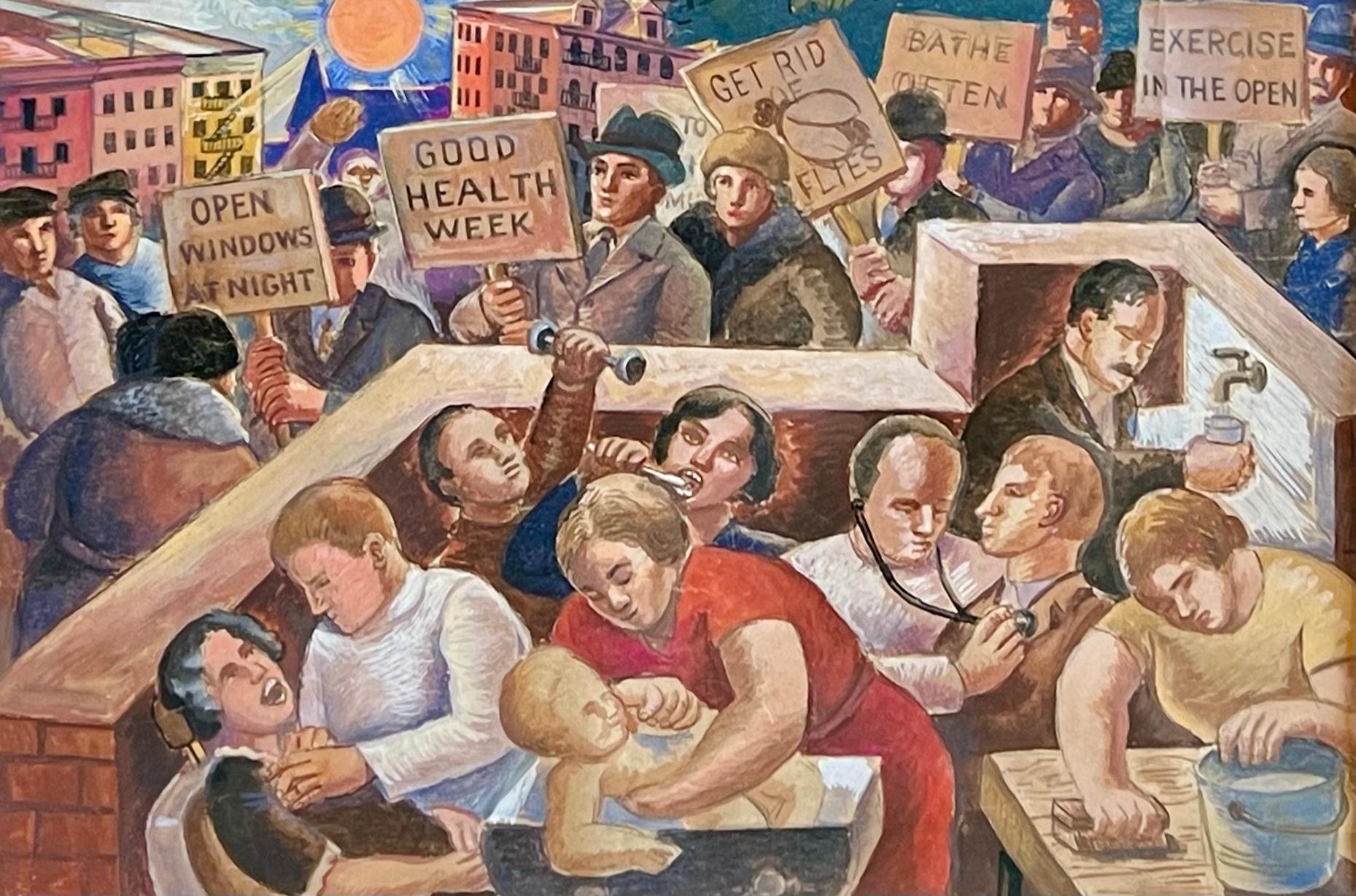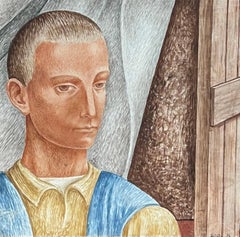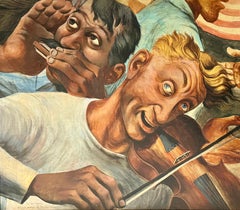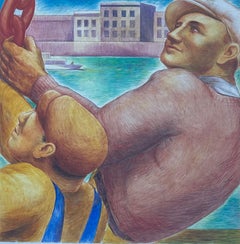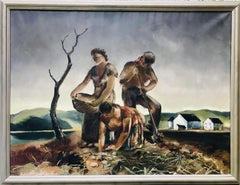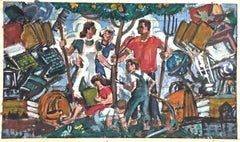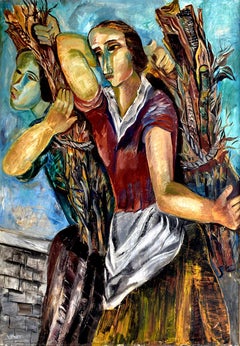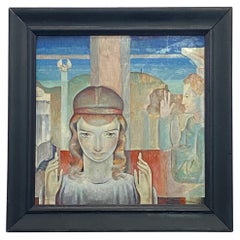Items Similar to WPA Mural Study American Scene Social Realism Mid 20th Century Modern Workers
Video Loading
Want more images or videos?
Request additional images or videos from the seller
1 of 9
Seymour FogelWPA Mural Study American Scene Social Realism Mid 20th Century Modern Workersc. 1930s/40s
c. 1930s/40s
$35,000
£26,489.58
€30,402.37
CA$49,860.41
A$54,074.79
CHF 28,402.13
MX$656,830.02
NOK 355,407.78
SEK 334,636.27
DKK 227,071.46
About the Item
WPA Mural Study American Scene Social Realism Mid 20th Century Modern Workers
Seymour Fogel (1911-1984)
Mural Study, untitled
11 x 49 1/4 inches (sight)
Tempera on board
Provenance: Graham Modern label verso
Framed 25 x 62 inches
BIO
Seymour Fogel was born in New York City on August 24, 1911. He studied at the Art Students League and at the National Academy of Design under George Bridgeman and Leon Kroll. When his formal studies were concluded in the early 1930s he served as an assistant to Diego Rivera who was then at work on his controversial Rockefeller Center mural. It was from Rivera that he learned the art of mural painting.
Fogel was awarded several mural commissions during the 1930s by both the Works Progress Administration (WPA) and the Treasury Section of Fine Arts, among them his earliest murals at the Abraham Lincoln High School in Brooklyn, New York in 1936, a mural in the WPA Building at the 1939-1940 New York World's Fair, a highly controversial mural at the U.S. Post Office in Safford, Arizona (due to his focus on Apache culture) in 1941 and two murals in what was then the Social Security Building in Washington, D.C., also in 1941. Fogel's artistic circle at this time included Phillip Guston, Ben Shahn, Franz Kline, Rockwell Kent and Willem de Kooning.
In 1946 Fogel accepted a teaching position at the University of Texas at Austin and became one of the founding artists of the Texas Modernist Movement. At this time he began to devote himself solely to abstract, non-representational art and executed what many consider to be the very first abstract mural in the State of Texas at the American National Bank in Austin in 1953. He pioneered the use of Ethyl Silicate as a mural medium. Other murals and public works of art done during this time (the late 1940s and 1950s) include the Baptist Student Center at the University of Texas (1949), the Petroleum Club in Houston (1951) and the First Christian Church, also in Houston (1956), whose innovative use of stained glass panels incorporated into the mural won Fogel a Silver Medal from the Architectural League of New York in 1958.
Fogel relocated to the Connecticut-New York area in 1959. He continued the Abstract Expressionism he had begun exploring in Texas, and began experimenting with various texturing media for his paintings, the most enduring of which was sand. In 1966 he was awarded a mural at the U.S. Federal Building in Fort Worth, Texas. The work, entitled "The Challenge of Space", was a milestone in his artistic career and ushered in what has been termed the Transcendental/Atavistic period of his art, a style he pursued up to his death in 1984. Painted and raw wood sculpture was also reflective of this style. Another mural done during this period was the U.S. Customs Building at Foley Square in New York City that was entirely executed in mosaic tiles, a mural medium he preferred in the last decades of his career.
Fogel's work is well represented in the collections of major museums, among them the Metropolitan Museum of Art and the Whitney Museum of American Art in New York City, the Dallas Museum of Fine Art in Texas, the National Portrait Gallery and the Hirshhorn Museum and Sculpture Garden in Washington, D.C., The State Museum of Louisiana in New Orleans, and the Telfair Museum in Savannah, Georgia.
During his life Fogel authored numerous articles on the interrelationship of art and architecture, served as a Vice President of the Architectural League of New York (1960) and has had his work imaged and/or discussed in some thirty books, including Nathanial Pousette-Dart's seminal work "American Painting Today" (1956) where Fogel was included along with the likes of Milton Avery, Robert Motherwell, Jackson Pollock, Edward Hopper, Yasuo Kuniyoshi and Stuart Davis as important American artists.
- Creator:Seymour Fogel (1911-1984, American)
- Creation Year:c. 1930s/40s
- Dimensions:Height: 25 in (63.5 cm)Width: 62 in (157.48 cm)
- Medium:
- Movement & Style:
- Period:
- Condition:
- Gallery Location:New York, NY
- Reference Number:1stDibs: LU1156215036892
About the Seller
5.0
Gold Seller
Premium sellers maintaining a 4.3+ rating and 24-hour response times
Established in 2008
1stDibs seller since 2019
195 sales on 1stDibs
Typical response time: <1 hour
- ShippingRetrieving quote...Shipping from: Pawling, NY
- Return Policy
Authenticity Guarantee
In the unlikely event there’s an issue with an item’s authenticity, contact us within 1 year for a full refund. DetailsMoney-Back Guarantee
If your item is not as described, is damaged in transit, or does not arrive, contact us within 7 days for a full refund. Details24-Hour Cancellation
You have a 24-hour grace period in which to reconsider your purchase, with no questions asked.Vetted Professional Sellers
Our world-class sellers must adhere to strict standards for service and quality, maintaining the integrity of our listings.Price-Match Guarantee
If you find that a seller listed the same item for a lower price elsewhere, we’ll match it.Trusted Global Delivery
Our best-in-class carrier network provides specialized shipping options worldwide, including custom delivery.More From This Seller
View AllWPA Mural Study 1940 American Scene Modern Social Realism Figurative Mid Century
By Michael Loew
Located in New York, NY
WPA Mural Study 1940 American Scene Modern Social Realism Figurative Mid Century
Michael Loew (1907-1985)
Detail for Mural (Social Security Building Washington D.C.)
24 x 24 inches ...
Category
1940s American Realist Figurative Paintings
Materials
Canvas, Oil
WPA Mural Study Mid-Century Modern American Scene Social Realism Workers
By Anton Refregier
Located in New York, NY
WPA Mural Study Mid-Century Modern American Scene Social Realism Workers
Anton Refregier (1905-1979)
Mural Study, Untitled
7 ¾ x 22 inches (sight)
Gouache, pencil, and charcoal on board, c. 1940s
Unsigned
Provenance: Estate of Seymour Fogel, noted verso
Thomas McCormick Gallery...
Category
1940s American Modern Mixed Media
Materials
Charcoal, Gouache, Board, Pencil
Post Office WPA Mural Study American Scene Social Realism Modern 20th Century
By Carlos Lopez
Located in New York, NY
Post Office WPA Mural Study American Scene Social Realism Modern 20th Century
Carlos Lopez (1910-1953)
"Bounty" WPA Mural Study for Michigan Post Office
19 ½ x 22 ½ inches
Oil on B...
Category
1940s American Realist Figurative Paintings
Materials
Oil, Board
St, Louis River Mural Study American Scene Social Realism Mid 20th Century WPA
By Jo Cain
Located in New York, NY
St, Louis River Mural Study American Scene Social Realism Mid 20th Century WPA
Jo Cain (1904-2003)
The Drama of the St. Louis Great River
23 1/4 x 25 ½ inches
Gouache on board c. 19...
Category
1930s American Realist Figurative Paintings
Materials
Gouache, Board
"Good Health Week" WPA American Scene Mid 20th Century Modern Social Realism
By Jo Cain
Located in New York, NY
"Good Health Week" WPA American Scene Mid 20th Century Modern Social Realism
Jo Cain (1904 – 2003)
Good Health Week
10 ½ x 15 1/2 inches
Oil on pape...
Category
1940s American Realist Figurative Drawings and Watercolors
Materials
Paper, Oil
WPA Post Office Mural Study American Scene Regionalism Social Realism Modern Art
By Louise Ronnebeck
Located in New York, NY
WPA Post Office Mural Study American Scene Regionalism Social Realism Modern Art
Louise Emerson Ronnebeck (1901 - 1980)
Oil Riggers, Mural Study
Image: 6 1/2 x 37 inches
Watercolor ...
Category
1930s American Modern Figurative Drawings and Watercolors
Materials
Watercolor, Cardboard, Paper
You May Also Like
“New Americans" 1941 WPA Exhibited Carnegie Percy Albee
Located in Exton, PA
Monumental, important WPA painting signed by Percy Albee. The painting is oil canvas measuring 36" x 48". Titled verso "New Americans", this WPA painting was exhibited at the Carnegi...
Category
1940s American Realist Figurative Paintings
Materials
Oil
Samuel Greenburg, Rural Scene Mural Study
Located in New York, NY
This Rural Scene Mural Study by Samuel Greenburg is scored in a manner indicating transfer to a larger format. However as yet no related image or mural is...
Category
Mid-20th Century Other Art Style Figurative Drawings and Watercolors
Materials
Tempera, Pencil
Gatherers of Dry Wood - Oil Painting Cubism - French
By Valentine Prax
Located in London, GB
VALENTINE ZADKINE PRAX 1897-1981
(French)
Title: Gatherers of Dry Wood / Ramasseuses de Bois Mort, circa 1925
Technique: Original Signed Oil Painting on canvas
size: 116.2 x 100.3 cm / 45.75 x 39.5 in
Additional Information: This original oil painting by Valentine Prax-Zadkine is hand signed by the artist at the lower left part.
It was painted in circa 1925.
Provenance:
Collection Pierre Alexandre Regnauld (1868-1954), Amsterdam.
Anonymous sale; Collection de Tableaux Modernes de feu P.A. Regnault, Paul Brandt...
Category
1920s Cubist Figurative Paintings
Materials
Oil
Modernist Style Painting by American Artist Raymond O'Neill, 1930's-1940's
Located in San Francisco, CA
Art Deco / Modernist style painting titled "Figures in Meditation" by American artist Raymond O'Neill (b.1893 - d.1962.)
Oil on board in painted wood ...
Category
Mid-20th Century American Mid-Century Modern Paintings
Materials
Paint
George Cecil Carter Mid-Century Modern Abstract Figurative Oil Painting, 1950s
Located in Denver, CO
This rare 1950s oil painting by Colorado abstract expressionist George Cecil Carter presents an abstracted figurative portrait of a couple—believed to represent Georgia O’Keeffe and Alfred Stieglitz. Rendered with bold brushwork and a dynamic modernist palette, the piece reflects Carter’s distinctive ability to merge abstraction with figuration, capturing both movement and emotional depth. Housed in a custom frame, the painting comes from a private collection in Denver, Colorado.
Carter (1908–1993) was a central figure in Colorado’s mid-century modernist movement. A self-taught artist influenced by modernist painter Charles Ragland Bunnell, Carter developed a uniquely expressive style that drew upon his working-class background as a miner and machinist. He exhibited nationally and worked alongside artists including Al Wynne, Mary Chenoweth...
Category
1950s American Modern Figurative Paintings
Materials
Oil
The Family, circa 1930's
By Bela Kadar
Located in London, GB
BELA KADAR 1877-1956
Budapest 1877-1956 (Hungarian)
Title: The Family, circa 1930's
Technique: Original Signed Tempera on paper
Image size: 90 x 71.5 cm / 35.4 x 28.2 in
Additional Information: The work is hand signed "Kadar Bela...
Category
1930s Expressionist Figurative Prints
Materials
Tempera
More Ways To Browse
Vintage Worker
Mid Century Modern Mosaic Art
1939 Fair
A Vintage Vice
Apache Vintage
Kent Rockwell
Mid Century Modern Mosaic Panels
Midcentury Modern Mosaic Tile Art
Mid Century Murals
Wpa Mural Study
Realism Eggs
Transcendental Art
Florence White Paintings
Gustav Likan
Kadar Bela
Mandolin Painting
Medusa Painting
Oil Painting Of Soldier
